Search Result
Results for "
YAP
" in MedChemExpress (MCE) Product Catalog:
3
Isotope-Labeled Compounds
| Cat. No. |
Product Name |
Target |
Research Areas |
Chemical Structure |
-
- HY-147322
-
|
|
YAP
|
Cancer
|
|
YAP/TAZ inhibitor-2 is a potent and orally active TEAD-YAP/TAZ inhibitor with an EC50 value of 3 nM. YAP/TAZ inhibitor-2 shows anti-proliferative activity. YAP/TAZ inhibitor-2 shows antitumor activity .
|
-
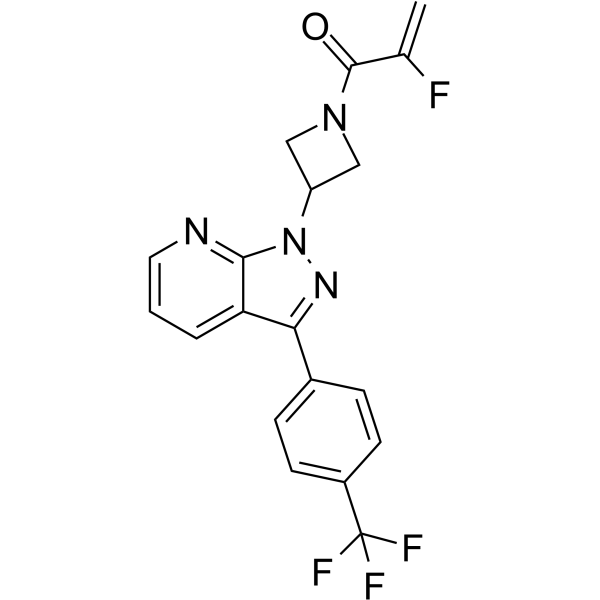
-
- HY-153811
-
|
|
YAP
|
Cancer
|
|
YAP-TEAD-IN-3 (compound 155) is a YAP/TAZ-TEAD inhibitor. YAP-TEAD-IN-3 inhibits Avi-humanTEAD 4217-434 with an IC50 value of 9 nM. YAP-TEAD-IN-3 also inhibits NCI-H2052 with an GI50 of 0.048 μM (cell proliferation),and an IC50 of 0.048 μM (YAP reporter gene expression),respsectively .
|
-
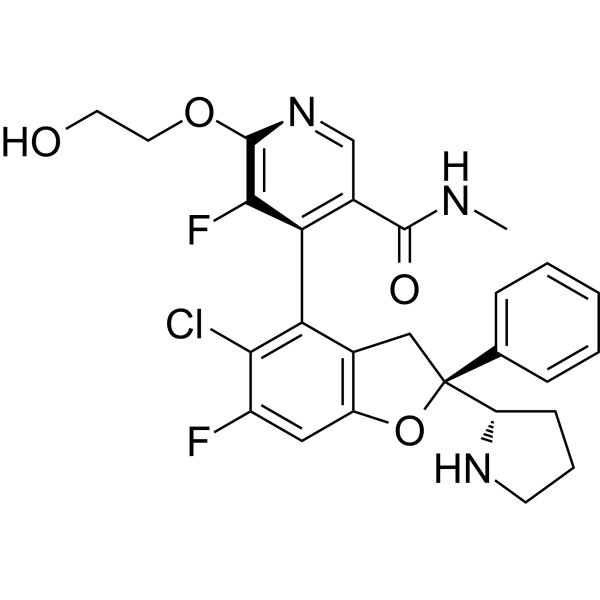
-
- HY-400902
-
|
|
YAP
|
Cancer
|
|
YAP/TAZ inhibitor-3 (Compound 24) is a YAP/TAZ inhibitor. YAP/TAZ inhibitor-3 shows firefly luciferase inhibitory activity, with an IC50 < 0.1 μM .
|
-
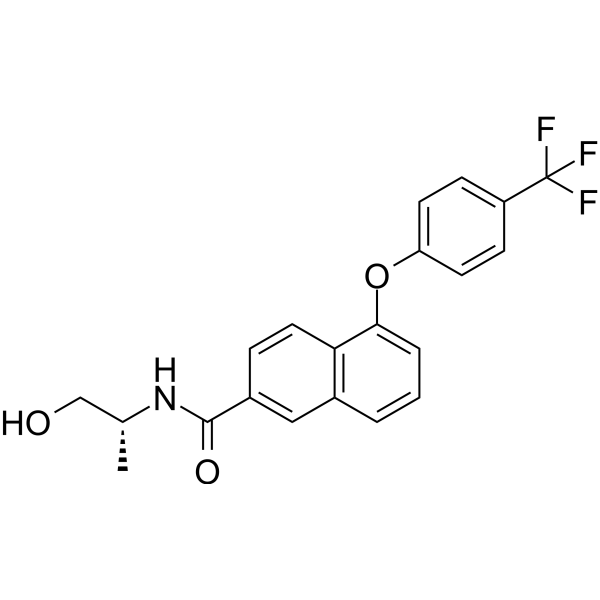
-
- HY-151525
-
|
|
YAP
|
Cancer
|
|
YAP-TEAD-IN-2 (compound 6) is a potent YAP-TEAD PPI (protein-protein interaction) inhibitor with IC50 is 2.7 nM .
|
-
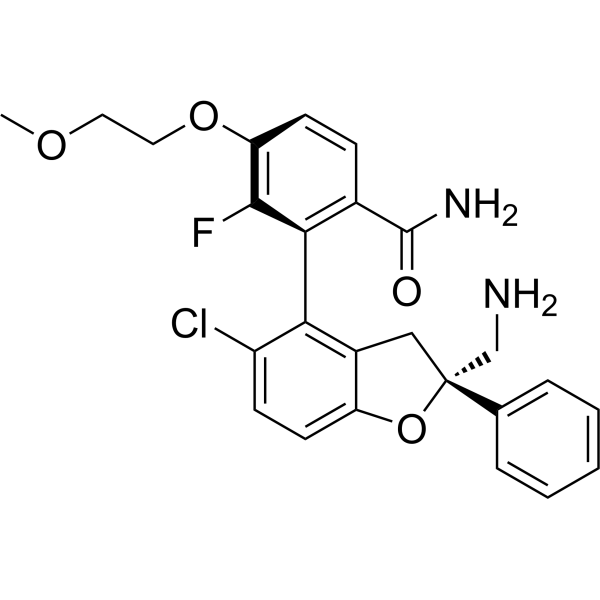
-
- HY-P2244
-
|
|
YAP
|
Cancer
|
|
YAP-TEAD-IN-1 is a potent and competitive inhibitor of YAP–TEAD interaction (IC50=25 nM). YAP-TEAD-IN-1 is a 17mer peptide and shows a higher the binding affinity to TEAD1 (Kd=15 nM) than YAP (50-171) (Kd=40 nM) .
|
-
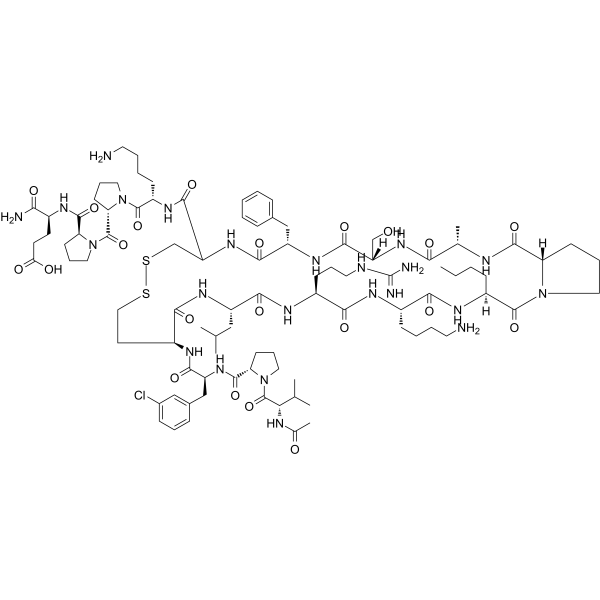
-
- HY-P2244A
-
|
|
YAP
|
Cancer
|
|
YAP-TEAD-IN-1 TFA is a potent and competitive peptide inhibitor of YAP-TEAD interaction (IC50=25 nM). YAP-TEAD-IN-1 TFA is a 17mer peptide and shows a higher the binding affinity to TEAD1 (Kd=15 nM) than YAP (50-171) (Kd= 40 nM) .
|
-
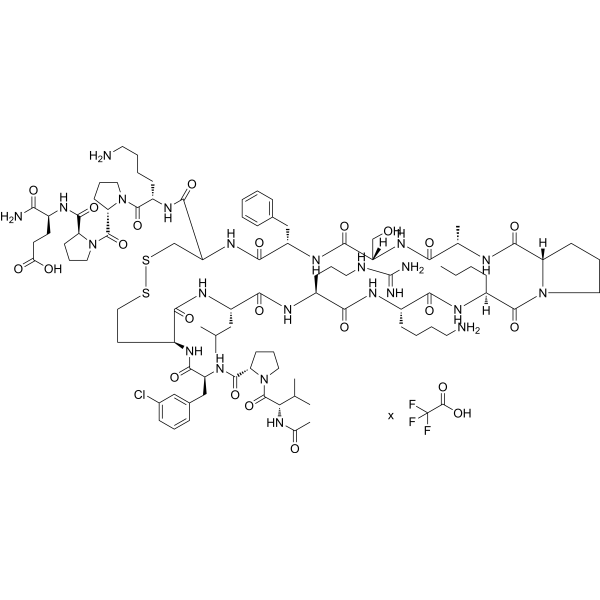
-
- HY-111429
-
|
|
YAP
|
Cancer
|
|
YAP/TAZ inhibitor-1 is a YAP/TAZ inhibitor extracted from patent WO2017058716A1, Compound 1, has an IC50 of <0.100 μΜ in firefly luciferase assay .
|
-
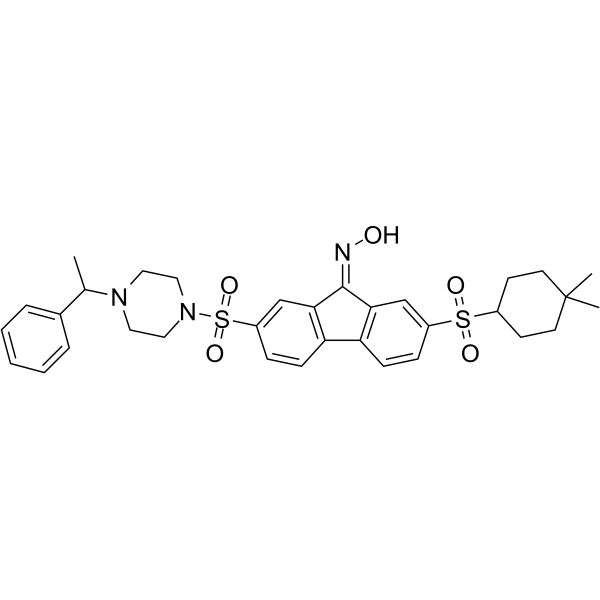
-
- HY-RS15911
-
|
|
Small Interfering RNA (siRNA)
|
Others
|
|
YAP1 Human Pre-designed siRNA Set A contains three designed siRNAs for YAP1 gene (Human), as well as a negative control, a positive control, and a FAM-labeled negative control.
|
-
YAP1 Human Pre-designed siRNA Set A
YAP1 Human Pre-designed siRNA Set A
-
- HY-RS15912
-
|
|
Small Interfering RNA (siRNA)
|
Others
|
|
Yap1 Mouse Pre-designed siRNA Set A contains three designed siRNAs for Yap1 gene (Mouse), as well as a negative control, a positive control, and a FAM-labeled negative control.
|
-
Yap1 Mouse Pre-designed siRNA Set A
Yap1 Mouse Pre-designed siRNA Set A
-
- HY-RS15913
-
|
|
Small Interfering RNA (siRNA)
|
Others
|
|
Yap1 Rat Pre-designed siRNA Set A contains three designed siRNAs for Yap1 gene (Rat), as well as a negative control, a positive control, and a FAM-labeled negative control.
|
-
Yap1 Rat Pre-designed siRNA Set A
Yap1 Rat Pre-designed siRNA Set A
-
- HY-155360
-
|
|
YAP
Apoptosis
|
Cancer
|
|
MY-1076 is an inhibitor of YAP. MY-1076 induces YAP degradation and cell apoptosis. MY-1076 inhibits MGC-803, SGC-7901, HCT-116 and KYSE450 cells proliferation with IC50 s of 0.019, 0.017, 0.020 and 0.044 μM, respectively .
|
-
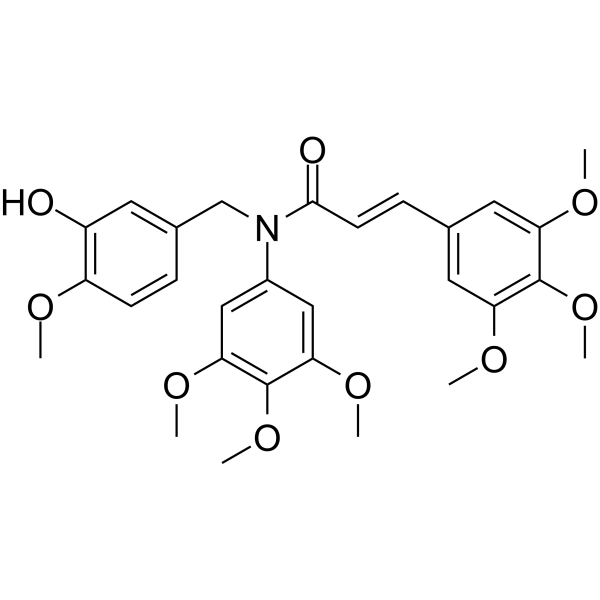
-
- HY-162126
-
|
|
Microtubule/Tubulin
YAP
|
Cancer
|
|
Tubulin polymerization-IN-58 (Compound K18) is a tubulin polymerization inhibitor with an IC50 of 0.446 μM. Tubulin polymerization-IN-58 also induces the degradation of oncogenic protein YAP via the UPS pathway, thus can be used for cancer research .
|
-
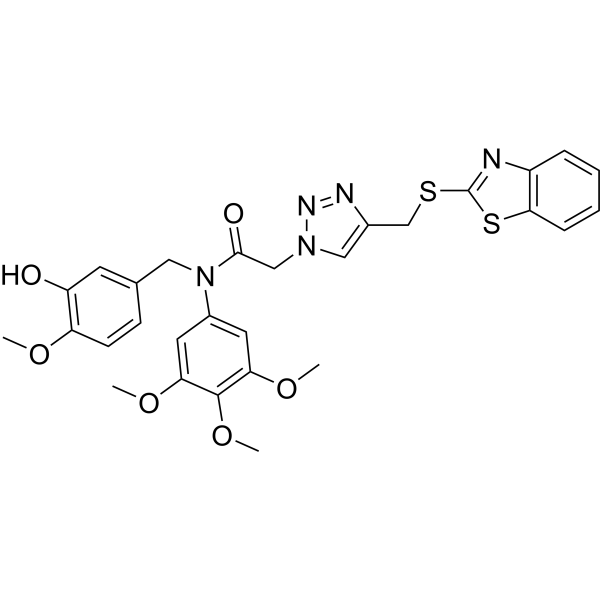
-
- HY-157083
-
|
|
YAP
|
Cancer
|
|
mCMY020 is a covalent inhibitor of TEAD. mCMY020 effectively reduces YAP (Yes-associated protein)-driven transcription and selectively slows the proliferation of Hippo-deficient cancer cells. mCMY020 can be used in cancer research .
|
-
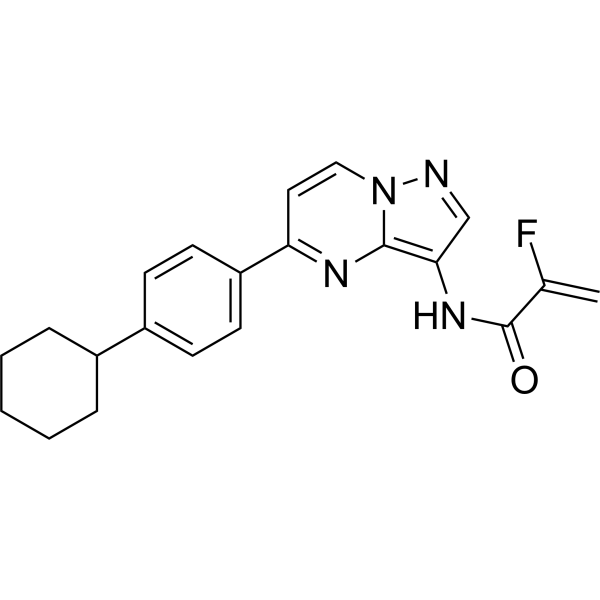
-
- HY-P1727
-
|
|
YAP
|
Cancer
|
|
Super-TDU is a specific YAP antagonist targeting YAP-TEADs interaction. Super-TDU suppresses tumor growth in gastric cancer mouse model .
|
-

-
- HY-P1727A
-
|
|
YAP
|
Cancer
|
|
Super-TDU TFA is a specific YAP antagonist targeting YAP-TEADs interaction. Super-TDU TFA suppresses tumor growth in gastric cancer mouse model .
|
-

-
- HY-156024
-
|
|
YAP
|
Others
|
|
TEAD-IN-6 (Example 11-1) is a TEAD modulator that blocks the interaction between YAP1/TAZ and TEAD. TEAD-IN-6 can be used in cancer research .
|
-
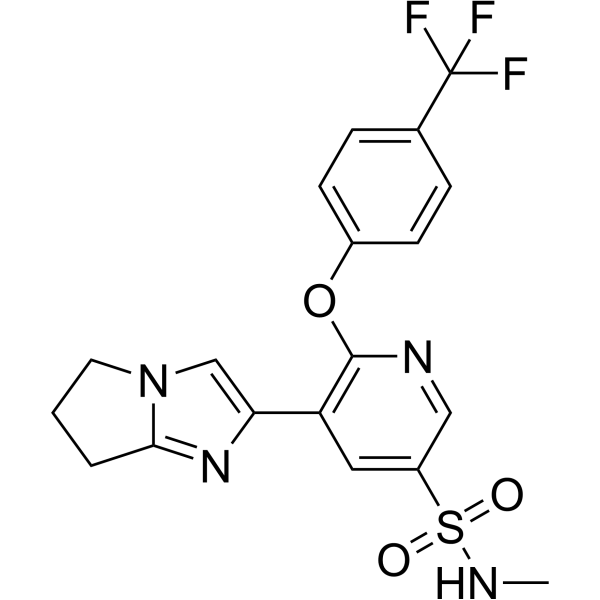
-
- HY-163173
-
|
|
YAP
|
Cancer
|
|
TEAD-IN-8 is a novel TEAD inhibitor, which potently and specifically inhibits TEAD-YAP transcriptional activities. TM2, alone or in combination with MEK inhibitors, exhibits potent antiproliferative effects in YAP-dependent cancer cells .
|
-
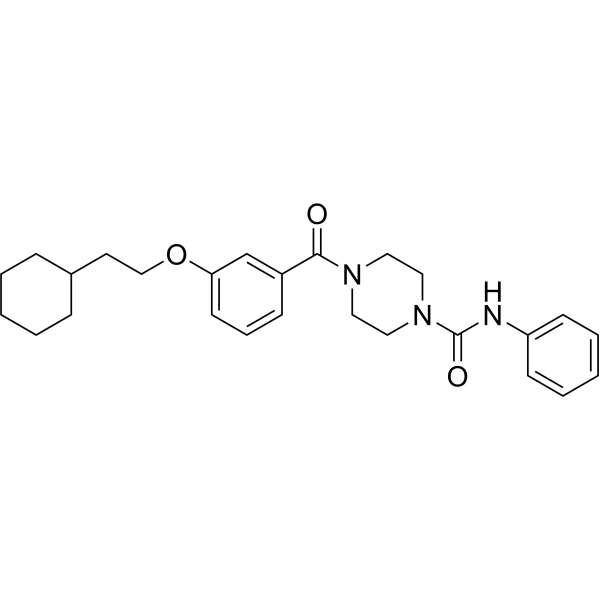
-
- HY-125269
-
TED-347
4 Publications Verification
|
YAP
|
Cancer
|
|
TED-347 is a potent, irreversible, covalent and allosteric inhibitor at YAP-TEAD protein-protein interaction with an EC50 of 5.9 μM for TEAD4⋅Yap1 protein-protein interaction. TED-347 specifically and covalently bonds with Cys-367 within the central pocket of TEAD4 with a Ki of 10.3 μM. TED-347 blocks TEAD transcriptional activity and has antitumor activity .
|
-
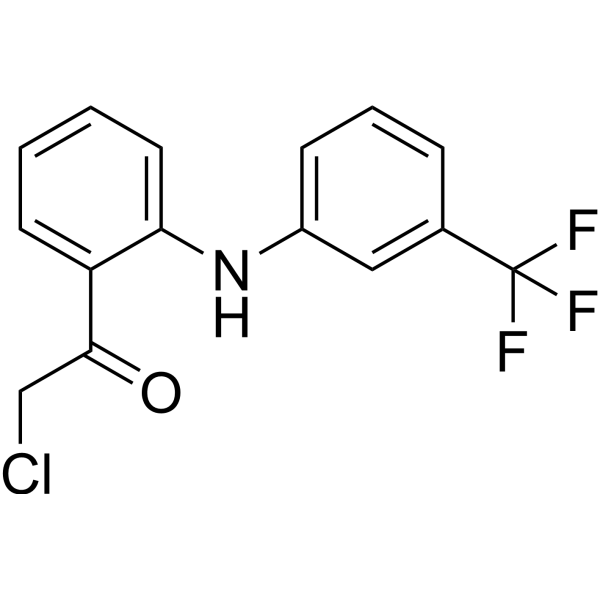
-
- HY-B0990
-
|
|
Bacterial
Antibiotic
|
Infection
|
|
Thiostrepton is a thiazole antibiotic which selectively inhibits FOXM1. FOXM1 binds to YAP/TEAD complex. YAP/TEAD/FOXM1 complex binding at regulatory regions of genes governing cell cycle may impact cell proliferation .
|
-
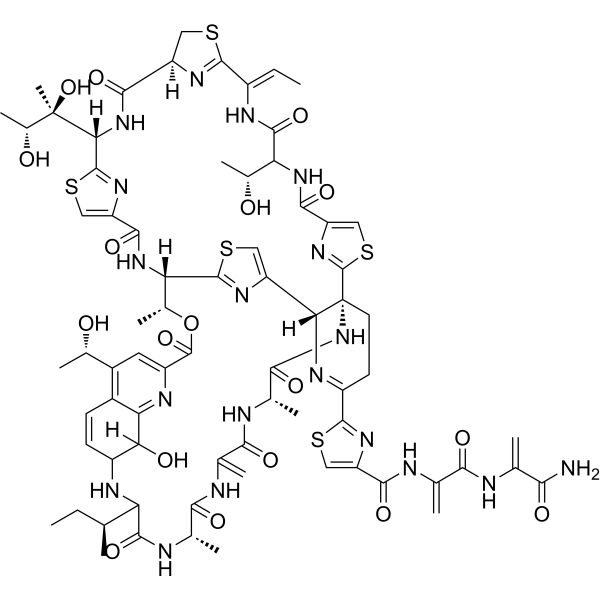
-
- HY-155338
-
|
|
YAP
|
Cancer
|
|
SWTX-143 is a novel covalent YAP/TAZ-TEAD inhibitor that binds to the palmitoylation pocket of all four TEAD isoforms. SWTX-143 causes irreversible and specific inhibition of the transcriptional activity of YAP/TAZ-TEAD and shows antitumor activity .
|
-
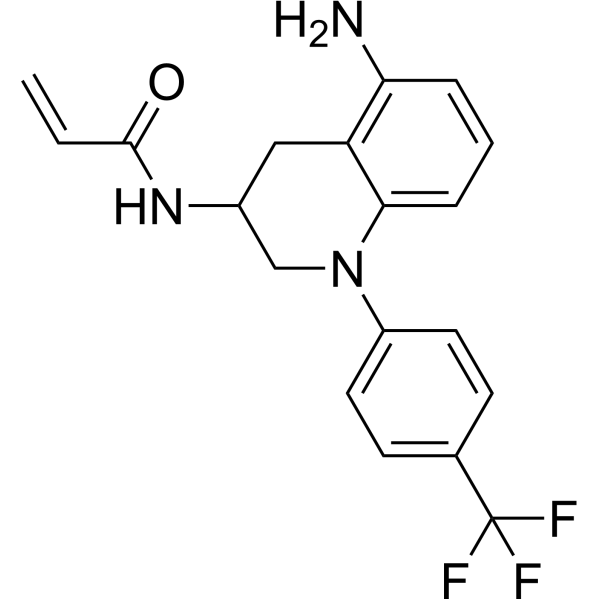
-
- HY-141644
-
PY-60
4 Publications Verification
|
YAP
|
Inflammation/Immunology
|
|
PY-60 is a robust and specific activator of YAP transcriptional activity that targets annexin A2 (ANXA2) with a Kd of 1.4 µM. PY-60 directly binds to ANXA2 and antagonizes its normal cellular function of repressing YAP activity .
|
-
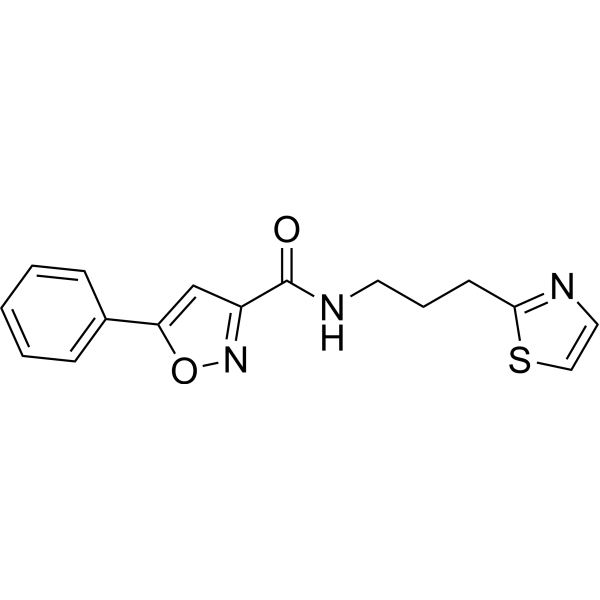
-
- HY-147214
-
|
|
YAP
|
Cancer
|
|
GNE-7883 is a pan-TEAD inhibitor with anti-cell proliferation activity. GNE-7883 overcomes resistance to KRAS G12C inhibitors in multiple preclinical models by inhibiting YAP/TAZ activation. GNE-7883 may be used in the study of YAP/TAZ-dependent cancers .
|
-
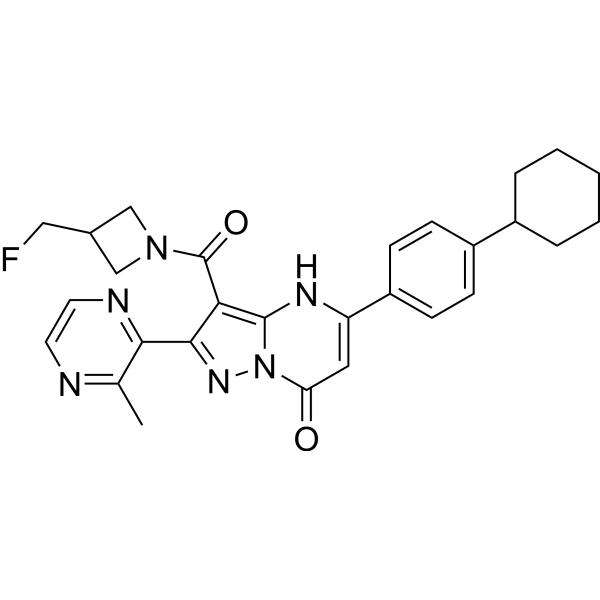
-
- HY-134955
-
VT103
2 Publications Verification
|
YAP
|
Cancer
|
|
VT103, an analog of VT101, is an orally active and selective TEAD1 protein palmitoylation inhibitor. VT103 inhibits YAP/TAZ-TEAD promoted gene transcription, blocks TEAD auto-palmitoylation, and disrupts interaction between YAP/TAZ and TEAD. VT103 can be used for the research of cancer .
|
-
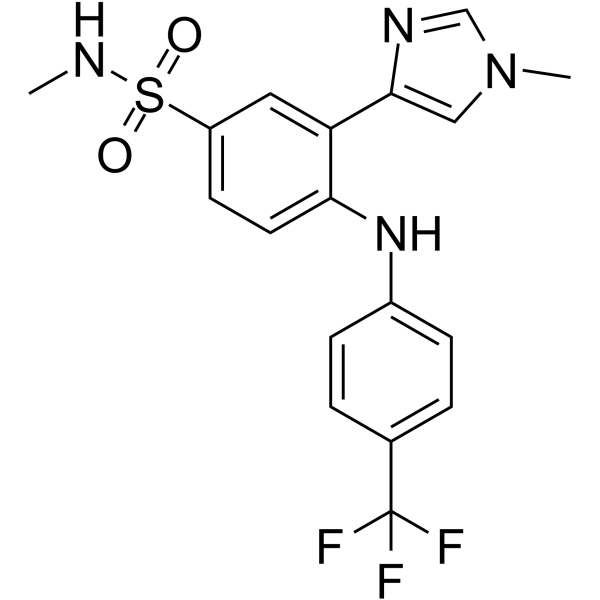
-
- HY-B0146
-
|
CL 318952
|
YAP
Apoptosis
Autophagy
|
Cancer
|
|
Verteporfin (CL 318952) is a photosensitizer for photodynamic therapy to eliminate the abnormal blood vessels in the eye associated with conditions such as age-related macular degeneration. Verteporfin is a YAP inhibitor which disrupts YAP-TEAD interactions. Verteporfin induces cell apoptosis . Verteporfinis an autophagy inhibitor that blocks autophagy at an early stage by inhibiting autophagosome formation .
|
-
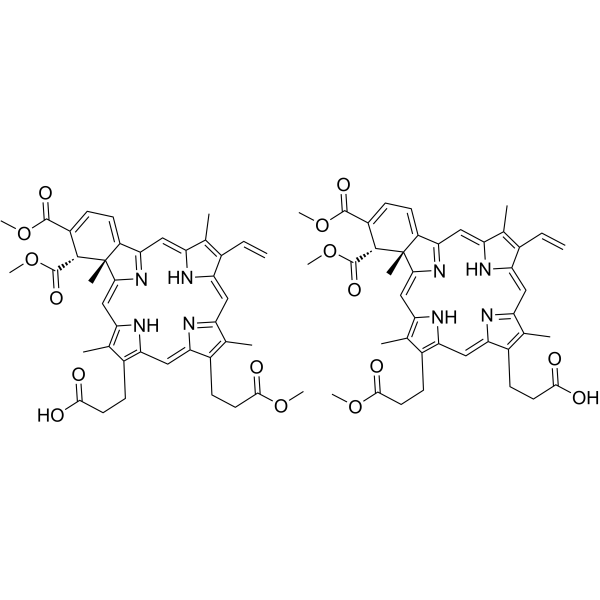
-
- HY-138565
-
|
|
YAP
|
Cancer
|
|
K-975 is a potent, selective and orally active TEAD inhibitor, with a strong inhibitory effect against protein-protein interactions between YAP1/TAZ and TEAD. K-975 covalently binds to Cys359 located in the palmitate-binding pocket of TEAD via an acrylamide structure. K-975 exhibits antitumor activity on malignant pleural mesothelioma .
|
-
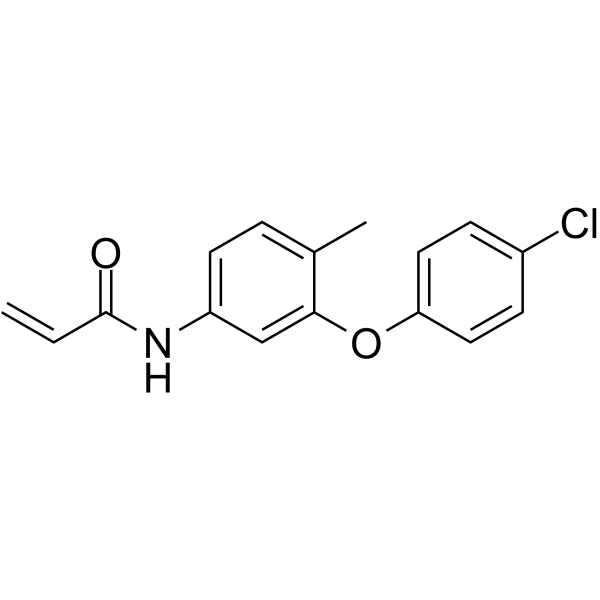
-
- HY-B0146R
-
|
CL 318952 (Standard)
|
YAP
Apoptosis
Autophagy
|
Cancer
|
|
Verteporfin (Standard) is the analytical standard of Verteporfin. This product is intended for research and analytical applications. Verteporfin (CL 318952) is a photosensitizer for photodynamic therapy to eliminate the abnormal blood vessels in the eye associated with conditions such as age-related macular degeneration. Verteporfin is a YAP inhibitor which disrupts YAP-TEAD interactions. Verteporfin induces cell apoptosis . Verteporfinis an autophagy inhibitor that blocks autophagy at an early stage by inhibiting autophagosome formation .
|
-
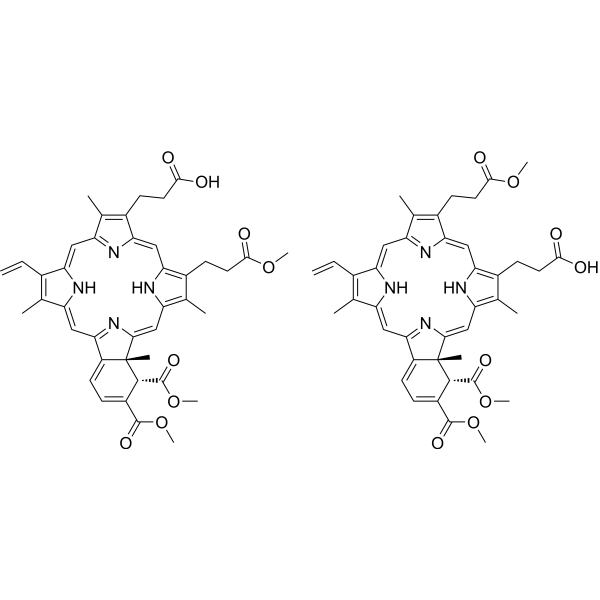
-
- HY-15417
-
|
|
Myosin
YAP
|
Cancer
|
|
ML-7 hydrochloride is a naphthalene sulphonamide derivative, potently inhibits MLCK (IC50=300 nM). ML-7 hydrochloride also inhibits YAP/TAZ.
|
-
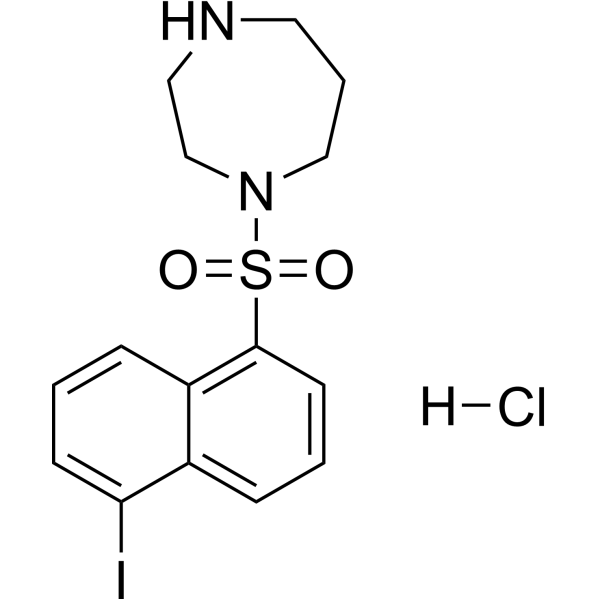
-
- HY-139603
-
|
|
YAP
|
Cancer
|
|
MYF-01-37 is a covalent TEAD inhibitor targeting Cys380. MYF-01-37 has a reversible inhibition on YAP/TEAD interaction .
|
-
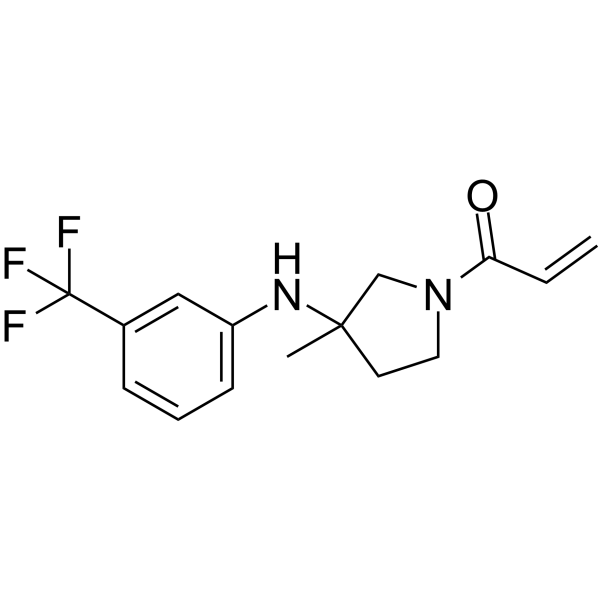
-
- HY-150256
-
|
|
YAP
|
Cancer
|
|
YTP-17 is an orally active YAP-TEAD protein-protein interaction inhibitor with an IC50 of 4 nM. YTP-17 shows anti-tumor efficacy .
|
-
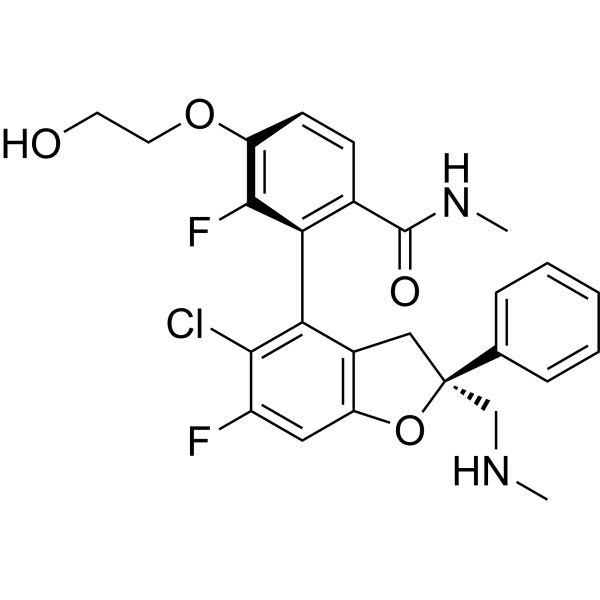
-
- HY-138489
-
|
Lats-IN-1
|
YAP
|
Others
|
|
TRULI (Lats-IN-1) is a potent and ATP-competitive inhibitor of Lats1 and Lats2 kinases. TRULI promotes Yap-dependent proliferation in postmitotic mammalian tissues .
|
-
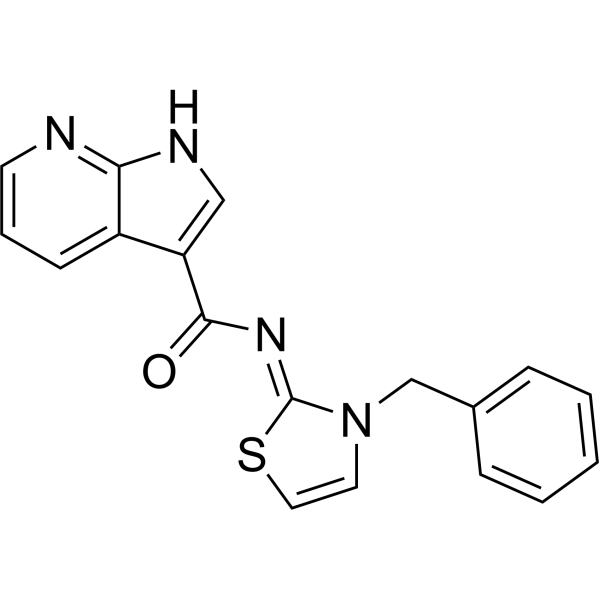
-
- HY-13417A
-
|
Acadesine phosphate; AICA Riboside phosphate
|
AMPK
Autophagy
YAP
Mitophagy
Endogenous Metabolite
|
Cancer
|
|
AICAR phosphate (Acadesine phosphate) is an adenosine analog and a AMPK activator. AICAR phosphate regulates the glucose and lipid metabolism, and inhibits proinflammatory cytokines and iNOS production. AICAR phosphate is also an autophagy, YAP and mitophagy inhibitor .
|
-
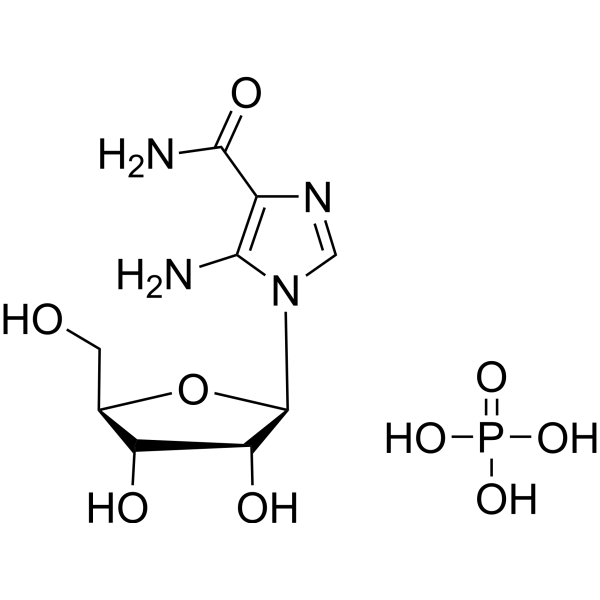
-
- HY-13417
-
|
Acadesine; AICA Riboside
|
AMPK
Autophagy
YAP
Mitophagy
Endogenous Metabolite
|
Cancer
|
|
AICAR (Acadesine) is an adenosine analog and a AMPK activator. AICAR regulates the glucose and lipid metabolism, and inhibits proinflammatory cytokines and iNOS production. AICAR is also an autophagy, YAP and mitophagy inhibitor .
|
-
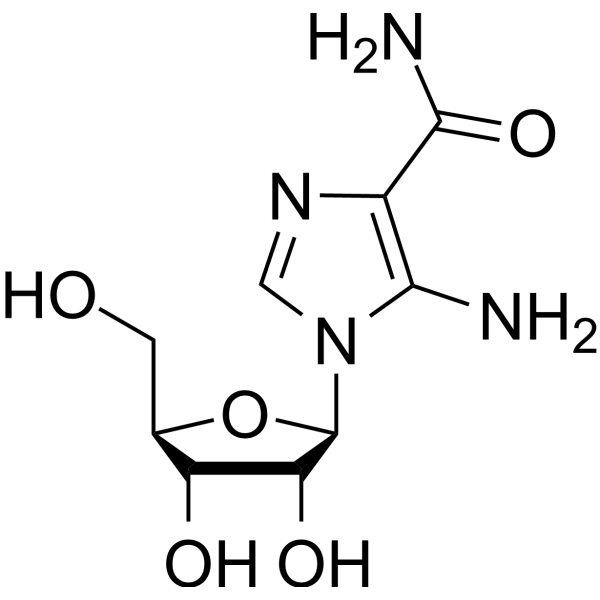
-
- HY-150042
-
|
|
YAP
|
Cardiovascular Disease
Others
|
|
TDI-011536 is a potent Lats kinase inhibitor, interrupts Hippo-Yap signaling and initiates the proliferation of lesioned heartmuscle cells. TDI-011536 can be used in studies of organ conservation and regeneration .
|
-
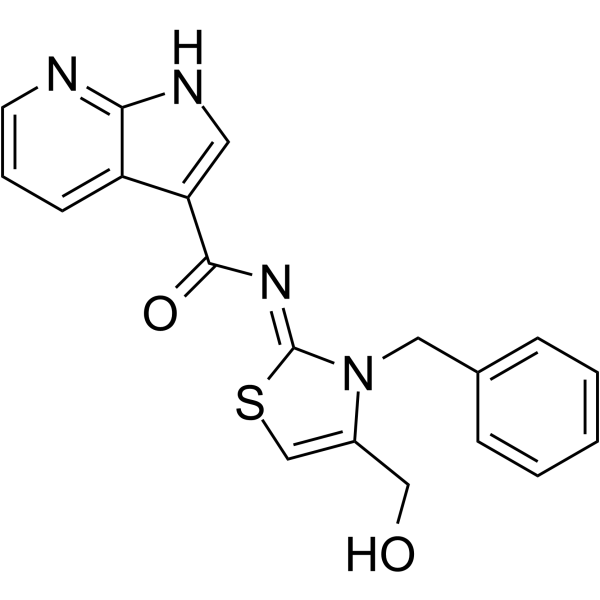
-
- HY-134956
-
|
|
YAP
|
Cancer
|
|
VT104 is a potent and orally active YAP/TAZ inhibitor. VT104 prevents palmitoylation of endogenous TEAD1 and TEAD3 proteins. VT104 can be used in research of cancer .
|
-
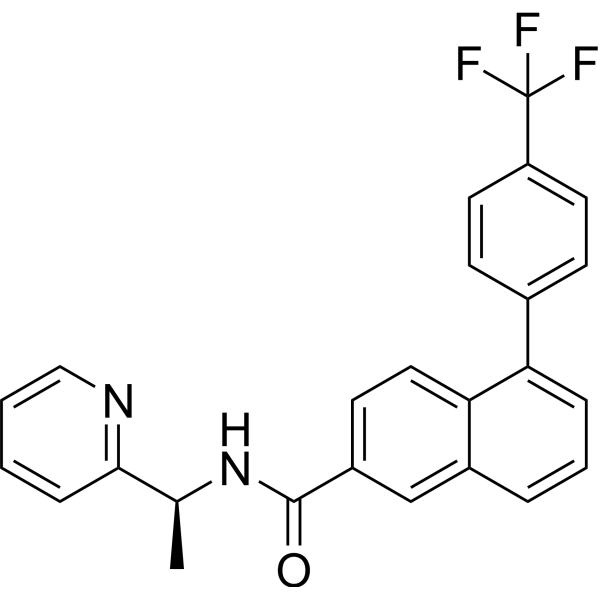
-
- HY-125016
-
|
TAZ-K
|
YAP
|
Cardiovascular Disease
|
|
TT-10 (TAZ-K) is an activator of YES-associated protein (YAP)-transcriptional enhancer factor domain (TEAD) activity. TT-10 can be used for the research of heart diseases accompanied by cardiomyocyte loss .
|
-
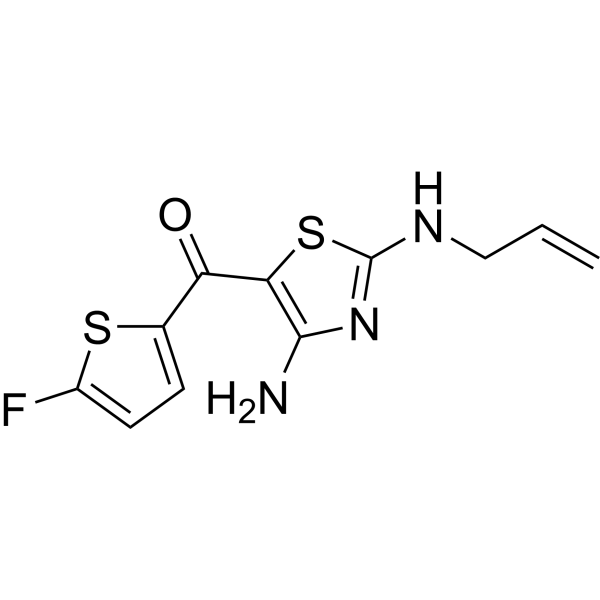
-
- HY-147208
-
|
|
YAP
|
Cancer
|
|
MSC-4106 is an orally active and potent inhibitor of YAP/TAZ-TEAD. MSC-4106 inhibits TEAD1 or TEAD3 auto-palmitoylation and shows inhibitory effect on NCI-H226 tumor xenograft model .
|
-
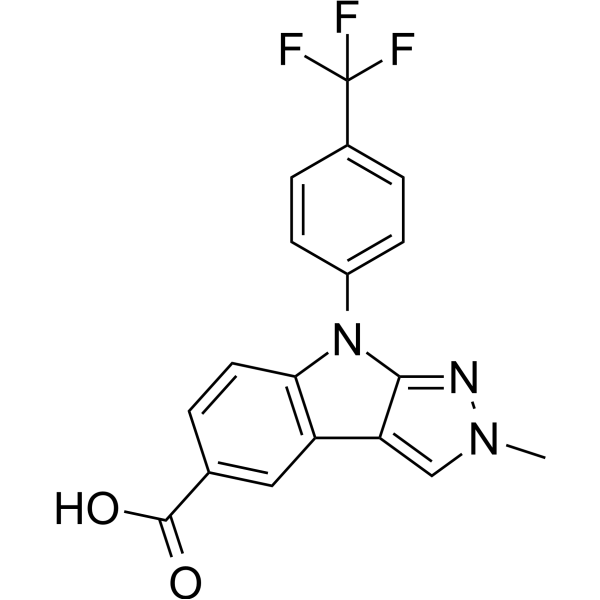
-
- HY-P1728
-
|
|
YAP
|
Cancer
|
|
Super-TDU (1-31) is a peptide fragment of Super-TDU. Super-TDU (1-31) is an inhibitor of YAP-TEAD complex. Super-TDU shows potent anti-tumor activity and suppresses tumor growth in gastric cancer mouse model .
|
-
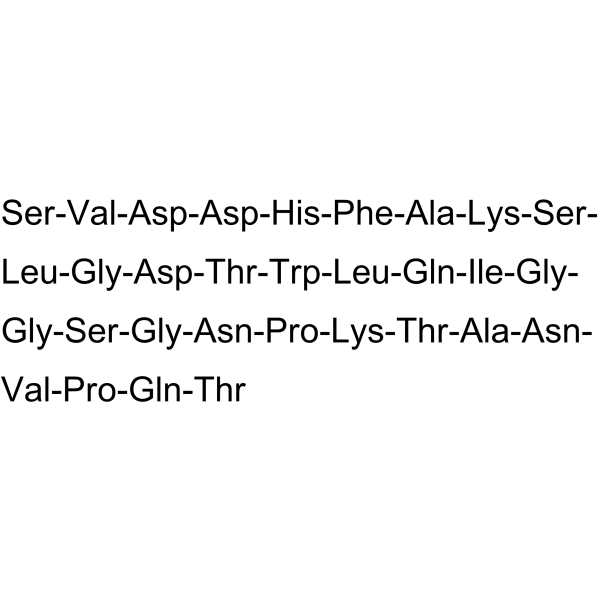
-
- HY-147135
-
|
TEAD-IN-3
|
YAP
|
Cancer
|
|
MYF-03-69 (TEAD-IN-3) is a potent and irreversible TEAD inhibitor. MYF-03-69 disrupts YAP-TEAD association, suppresses TEAD transcriptional activity and inhibits cell growth of Hippo signaling defective malignant pleural mesothelioma (MPM) .
|
-
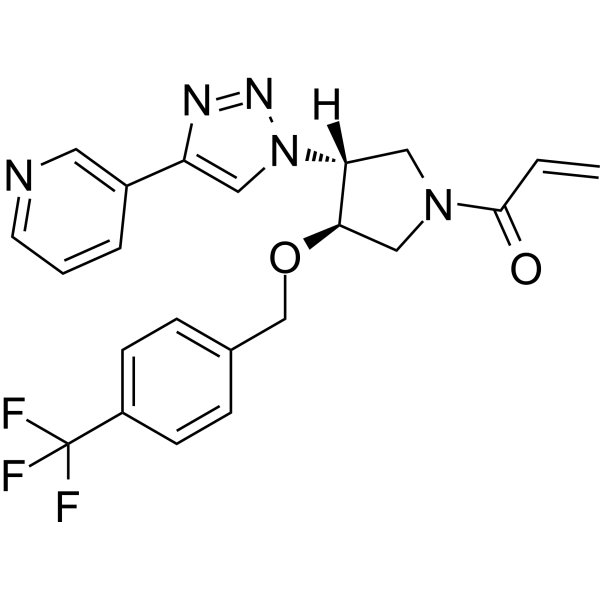
-
- HY-P1728A
-
|
|
YAP
|
Cancer
|
|
Super-TDU (1-31) TFA is a peptide fragment of Super-TDU. Super-TDU (1-31) TFA is an inhibitor of YAP-TEAD complex. Super-TDU TFA shows potent anti-tumor activity and suppresses tumor growth in gastric cancer mouse model .
|
-

-
- HY-N7223
-
|
|
YAP
Apoptosis
|
Cancer
|
|
Lappaol F, a lignin, is an anticancer agent. Lappaol F inhibits YAP<、b> mRNA and protein level. Lappaol F inhibits tumor cell growth by inducing cell cycle arrest. Lappaol F induces cancer cell apoptosis, and inhibits tumor growth. Lappaol F can be isolated from Arctium lappa Linne (Asteraceae) .
|
-
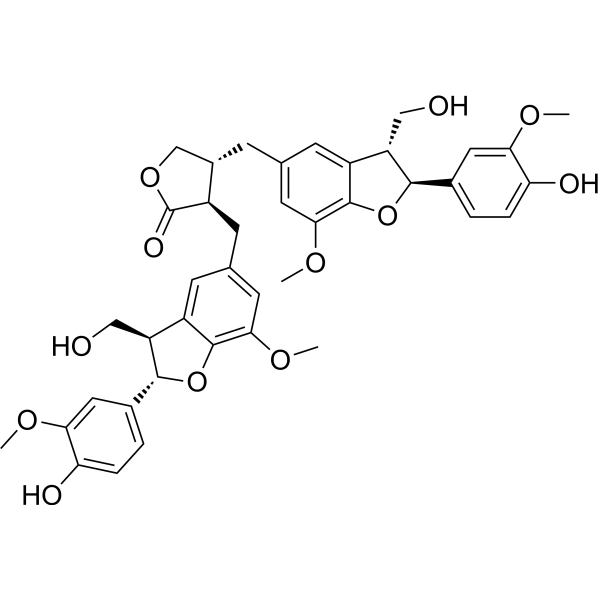
-
- HY-147165
-
|
|
YAP
|
Cancer
|
|
VT02956 is a LATS inhibitor (IC50: 0.76 nM for LATS1, 0.52 nM for LATS2). VT02956 targets the Hippo pathway. VT02956 inhibits ESR1 expression and growth of ER+ breast cancer cell lines and patient-derived tumor organoids . VT02956 is a click chemistry reagent, it contains an Alkyne group and can undergo copper-catalyzed azide-alkyne cycloaddition (CuAAc) with molecules containing Azide groups.
|
-
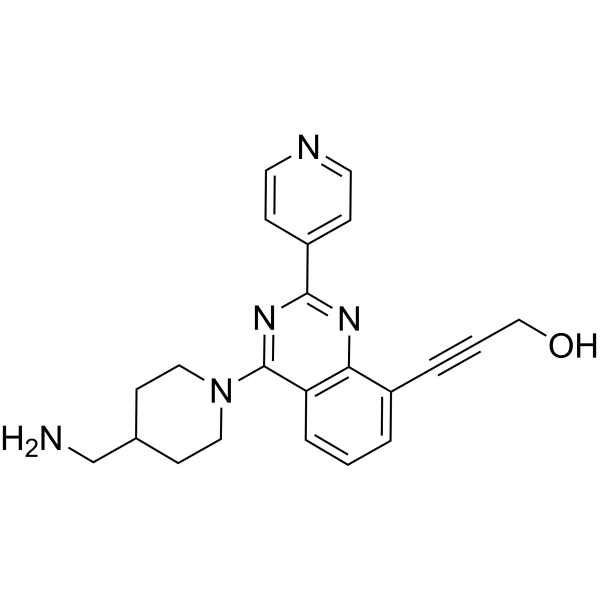
-
- HY-101299A
-
|
DAR-0100
|
Dopamine Receptor
|
Neurological Disease
|
|
Dihydrexidine (DAR-0100) is a high potent, selective and full efficacy D1-like dopamine receptor (D1/D5) agonist with an IC50 of 10 nM for D1 receptor. Dihydrexidine exhibits potent antiparkinsonian activity . Dihydrexidine can stimulate YAP phosphorylation .
|
-
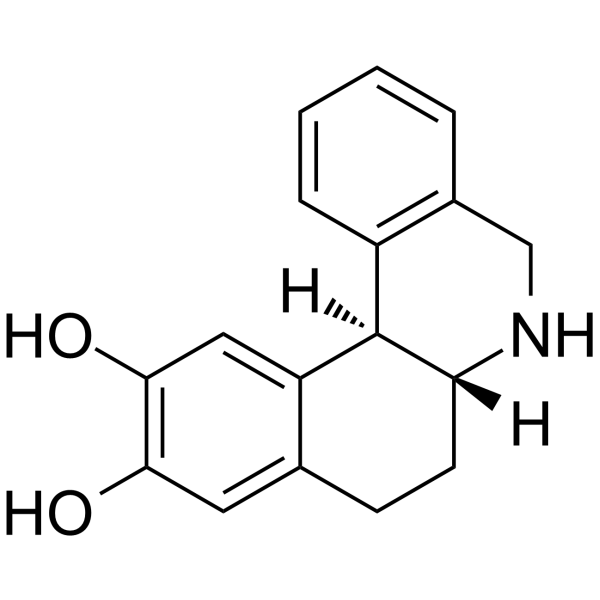
-
- HY-101299B
-
|
DAR-0100 hydrochloride
|
Dopamine Receptor
|
Neurological Disease
|
|
Dihydrexidine hydrochloride (DAR-0100 hydrochloride) is a high potent, selective and full efficacy D1-like dopamine receptor (D1/D5) agonist, with an IC50 of 10 nM for D1 receptor. Dihydrexidine hydrochloride exhibits potent antiparkinsonian activity . Dihydrexidine hydrochloride can stimulate YAP phosphorylation .
|
-
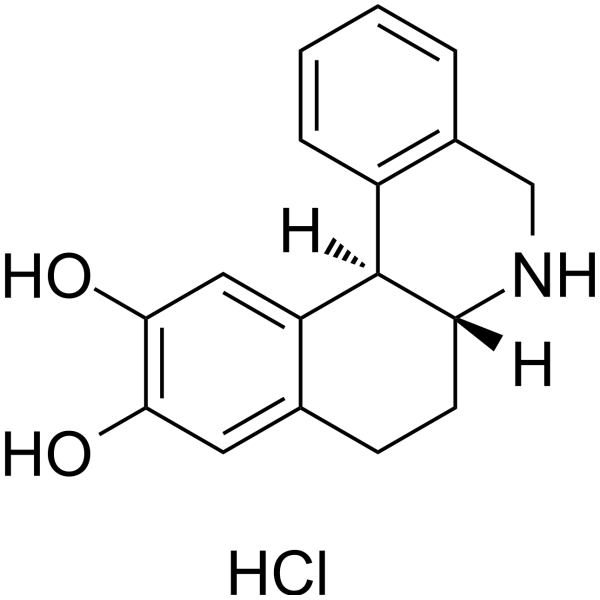
-
- HY-156397
-
|
|
AMPK
|
Inflammation/Immunology
Cancer
|
|
HTH-02-006 is a NUAK2 inhibitor (IC50?=?126?nM). HTH-02-006 reduces levels of phosphorylated MYPT1 in HuCCT-1 cells. HTH-02-006 inhibits YAP-driven cell proliferation, hepatomegaly and tumorigenesis. HTH-02-006 also has antifibrotic protective effect .
|
-
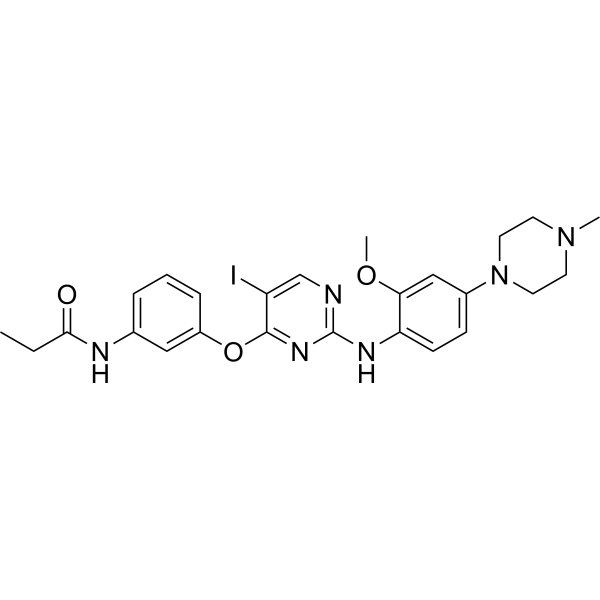
-
- HY-B1221
-
|
|
COX
AMPK
Potassium Channel
Chloride Channel
Calcium Channel
Parasite
|
Inflammation/Immunology
|
|
Flufenamic acid is a non-steroidal anti-inflammatory agent, inhibits cyclooxygenase (COX), activates AMPK, and also modulates ion channels, blocking chloride channels and L-type Ca 2+ channels, modulating non-selective cation channels (NSC), activating K + channels. Flufenamic acid binds to the central pocket of TEAD2 YBD and inhibits both TEAD function and TEAD-YAP-dependent processes, such as cell migration and proliferation.
|
-
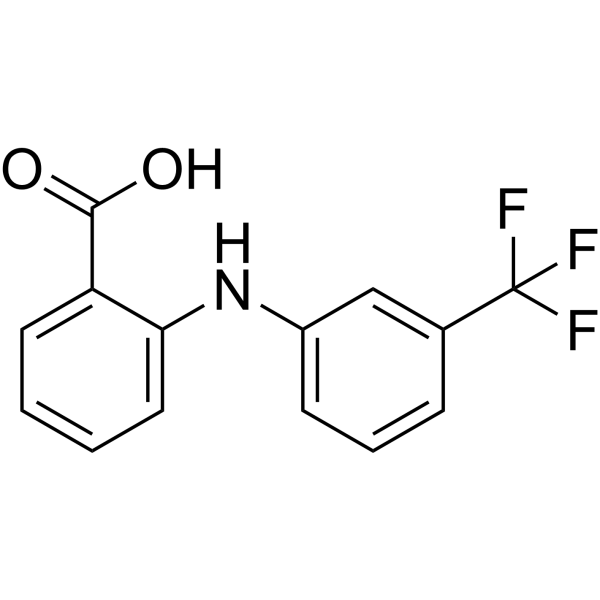
-
- HY-13417S
-
|
Acadesine-13C2,15N; AICA Riboside-13C2,15N
|
Isotope-Labeled Compounds
|
Others
|
|
AICAR- 13C2, 15N (Acadesine- 13C2, 15N; AICA Riboside- 13C2, 15N)is the 13C and 15N labeledAICAR(HY-13417) . AICAR (Acadesine) is an adenosine analog and a AMPK activator. AICAR regulates the glucose and lipid metabolism, and inhibits proinflammatory cytokines and iNOS production. AICAR is also an autophagy, YAP and mitophagy inhibitor .
|
-
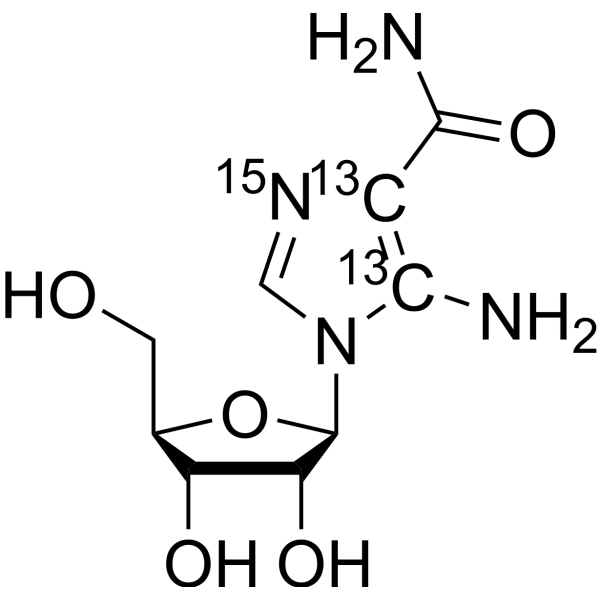
-
- HY-13285
-
|
Debio 0719
|
LPL Receptor
|
Neurological Disease
Cancer
|
|
Ki16425 (Debio 0719) is a subtype-selective, competitive antagonist of the EDG-family receptors, LPA1 and LPA3 with Kis of 0.34 μM and 0.93 μM, respectively. Ki16425 (Debio 0719) reduces the LPA-induced activation of p42/p44 MAPK . Ki16425 can also inhibit LPA-induced dephosphorylation of Yes-associated protein (YAP)/TAZ in HEK293A cells .
|
-
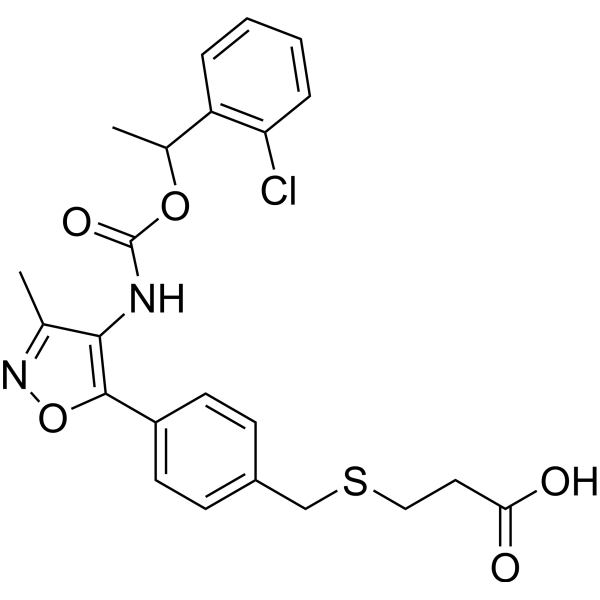
-
- HY-B1221S
-
|
|
Isotope-Labeled Compounds
COX
AMPK
Potassium Channel
Chloride Channel
Calcium Channel
Parasite
|
Inflammation/Immunology
|
|
Flufenamic acid-d4 is deuterium labeled Flufenamic acid. Flufenamic acid is a non-steroidal anti-inflammatory agent, inhibits cyclooxygenase (COX), activates AMPK, and also modulates ion channels, blocking chloride channels and L-type Ca 2+ channels, modulating non-selective cation channels (NSC), activating K+ channels. Flufenamic acid binds to the central pocket of TEAD2 YBD and inhibits both TEAD function and TEAD-YAP-dependent processes, such as cell migration and proliferation.
|
-
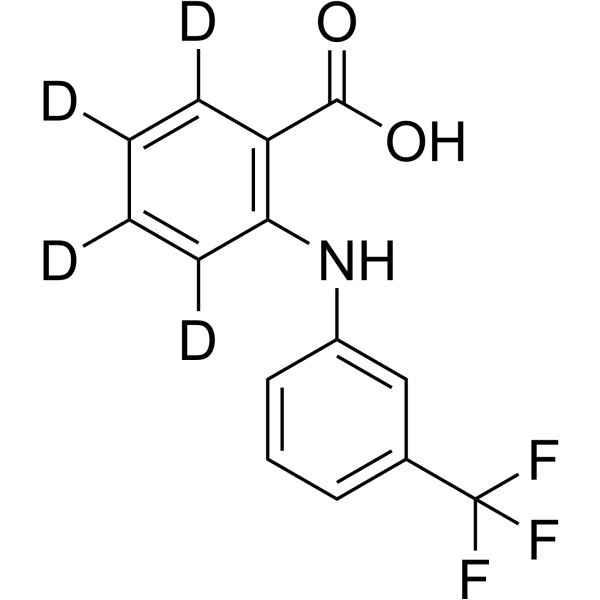
-
- HY-B1221S1
-
|
|
Isotope-Labeled Compounds
COX
AMPK
Potassium Channel
Chloride Channel
Calcium Channel
Parasite
|
Inflammation/Immunology
|
|
Flufenamic acid- 13C6 is the 13C6 labeled Flufenamic acid. Flufenamic acid is a non-steroidal anti-inflammatory agent, inhibits cyclooxygenase (COX), activates AMPK, and also modulates ion channels, blocking chloride channels and L-type Ca 2+ channels, modulating non-selective cation channels (NSC), activating K+ channels. Flufenamic acid binds to the central pocket of TEAD2 YBD and inhibits both TEAD function and TEAD-YAP-dependent processes, such as cell migration and proliferation.
|
-
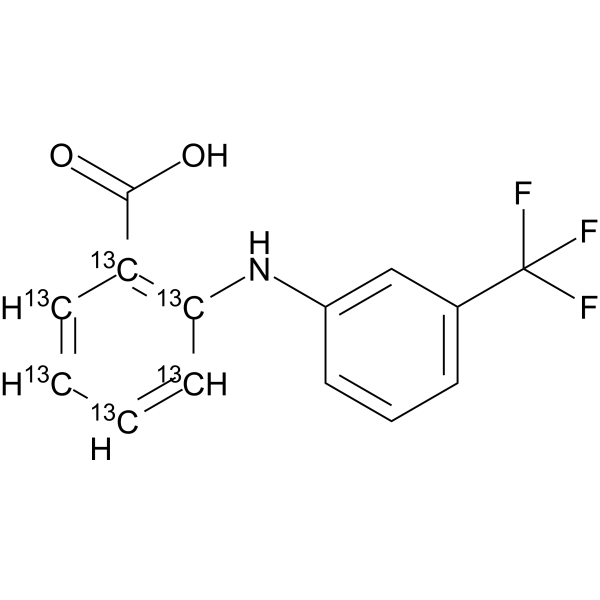
-
- HY-147082
-
|
|
YAP
|
Cancer
|
|
GA-017 is a potent and selective LATS1 and LATS2 (large tumor suppressor kinase 1/2) inhibitor, with IC50 values of 4.10 and 3.92 nM, respectively. GA-017 is an activator of cell proliferation. GA-017 promotes YAP/TAZ activation and nuclear translocation. GA-017 promotes cell growth under 3D culture conditions. GA-017 enhances the ex vivo formation of mouse intestinal organoids .
|
-
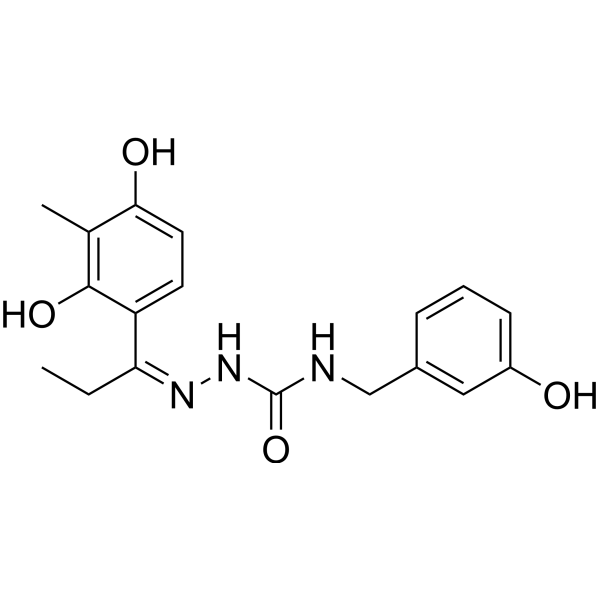
- HY-N6682
-
|
Zygosporin A; NSC 209835
|
Arp2/3 Complex
Antibiotic
YAP
|
Infection
|
|
Cytochalasin D (Zygosporin A) is a potent actin polymerization inhibitor, could be derived from fungus. Cytochalasin D has cell-permeable activity. Cytochalasin D inhibits the G-actin–cofilin interaction by binding to G-actin. Cytochalasin D also inhibits the binding of cofilin to F-actin and decreases the rate of both actin polymerization and depolymerization in living cells. Cytochalasin D can reduce exosome release, in turn reducing the amount of survivin present in the tumour environment. Cytochalasin D induces phosphorylation and cytoplasmic retention of Yap .
|
-
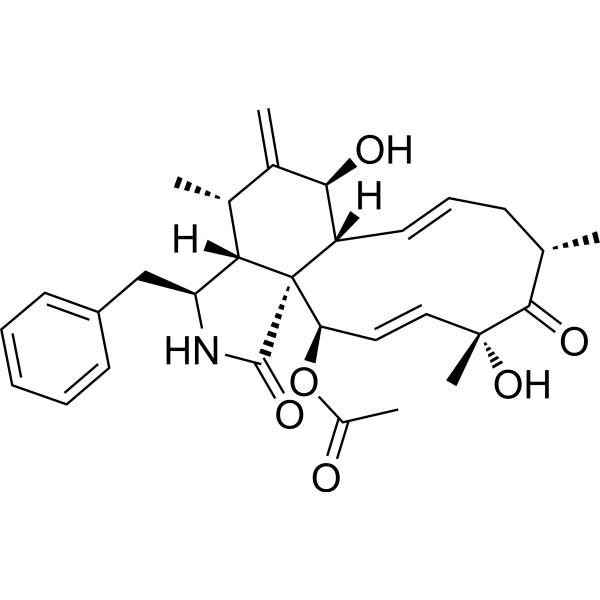
- HY-10108
-
LY294002
Maximum Cited Publications
686 Publications Verification
|
PI3K
Casein Kinase
DNA-PK
Apoptosis
Autophagy
|
Infection
Cancer
|
|
LY294002 is a broad-spectrum inhibitor of PI3K with IC50s of 0.5, 0.57, and 0.97 μM for PI3Kα, PI3Kδ and PI3Kβ, respectively . LY294002 also inhibits CK2 with an IC50 of 98 nM . LY294002 is a competitive DNA-PK inhibitor that binds reversibly to the kinase domain of DNA-PK with an IC50 of 1.4 μM. LY294002 is an apoptosis activator .
|
-
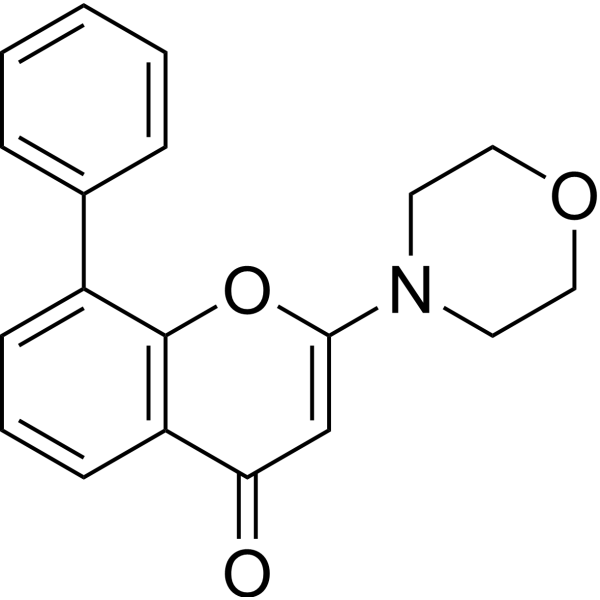
| Cat. No. |
Product Name |
Target |
Research Area |
-
- HY-P2244A
-
|
|
YAP
|
Cancer
|
|
YAP-TEAD-IN-1 TFA is a potent and competitive peptide inhibitor of YAP-TEAD interaction (IC50=25 nM). YAP-TEAD-IN-1 TFA is a 17mer peptide and shows a higher the binding affinity to TEAD1 (Kd=15 nM) than YAP (50-171) (Kd= 40 nM) .
|
-
- HY-P1727
-
|
|
YAP
|
Cancer
|
|
Super-TDU is a specific YAP antagonist targeting YAP-TEADs interaction. Super-TDU suppresses tumor growth in gastric cancer mouse model .
|
-
- HY-B0990
-
Thiostrepton
Maximum Cited Publications
11 Publications Verification
|
Bacterial
Antibiotic
|
Infection
|
|
Thiostrepton is a thiazole antibiotic which selectively inhibits FOXM1. FOXM1 binds to YAP/TEAD complex. YAP/TEAD/FOXM1 complex binding at regulatory regions of genes governing cell cycle may impact cell proliferation .
|
-
- HY-P2244
-
|
|
YAP
|
Cancer
|
|
YAP-TEAD-IN-1 is a potent and competitive inhibitor of YAP–TEAD interaction (IC50=25 nM). YAP-TEAD-IN-1 is a 17mer peptide and shows a higher the binding affinity to TEAD1 (Kd=15 nM) than YAP (50-171) (Kd=40 nM) .
|
-
- HY-P1727A
-
|
|
YAP
|
Cancer
|
|
Super-TDU TFA is a specific YAP antagonist targeting YAP-TEADs interaction. Super-TDU TFA suppresses tumor growth in gastric cancer mouse model .
|
-
- HY-P1728
-
|
|
YAP
|
Cancer
|
|
Super-TDU (1-31) is a peptide fragment of Super-TDU. Super-TDU (1-31) is an inhibitor of YAP-TEAD complex. Super-TDU shows potent anti-tumor activity and suppresses tumor growth in gastric cancer mouse model .
|
-
- HY-P1728A
-
|
|
YAP
|
Cancer
|
|
Super-TDU (1-31) TFA is a peptide fragment of Super-TDU. Super-TDU (1-31) TFA is an inhibitor of YAP-TEAD complex. Super-TDU TFA shows potent anti-tumor activity and suppresses tumor growth in gastric cancer mouse model .
|
| Cat. No. |
Product Name |
Category |
Target |
Chemical Structure |
| Cat. No. |
Compare |
Product Name |
Species |
Source |
Compare Products
|
| Products |
|
| Cat. No. |
|
| Species |
|
| Source |
|
| Tag |
|
| Accession |
|
| Gene ID |
|
| Molecular Weight |
|
| Purity |
|
| Endotoxin Level |
|
| Biological Activity |
|
| Appearance |
|
| Formulation |
|
| Storage & Stability |
|
| Shipping |
|
| Free Sample |
Yes
No
|
| Size |
* This product has been "discontinued".
Optimized version of product available:
|
| Cat. No. |
Product Name |
Chemical Structure |
-
- HY-13417S
-
|
|
|
AICAR- 13C2, 15N (Acadesine- 13C2, 15N; AICA Riboside- 13C2, 15N)is the 13C and 15N labeledAICAR(HY-13417) . AICAR (Acadesine) is an adenosine analog and a AMPK activator. AICAR regulates the glucose and lipid metabolism, and inhibits proinflammatory cytokines and iNOS production. AICAR is also an autophagy, YAP and mitophagy inhibitor .
|
-

-
- HY-B1221S
-
|
|
|
Flufenamic acid-d4 is deuterium labeled Flufenamic acid. Flufenamic acid is a non-steroidal anti-inflammatory agent, inhibits cyclooxygenase (COX), activates AMPK, and also modulates ion channels, blocking chloride channels and L-type Ca 2+ channels, modulating non-selective cation channels (NSC), activating K+ channels. Flufenamic acid binds to the central pocket of TEAD2 YBD and inhibits both TEAD function and TEAD-YAP-dependent processes, such as cell migration and proliferation.
|
-

-
- HY-B1221S1
-
|
|
|
Flufenamic acid- 13C6 is the 13C6 labeled Flufenamic acid. Flufenamic acid is a non-steroidal anti-inflammatory agent, inhibits cyclooxygenase (COX), activates AMPK, and also modulates ion channels, blocking chloride channels and L-type Ca 2+ channels, modulating non-selective cation channels (NSC), activating K+ channels. Flufenamic acid binds to the central pocket of TEAD2 YBD and inhibits both TEAD function and TEAD-YAP-dependent processes, such as cell migration and proliferation.
|
-

| Cat. No. |
Product Name |
Application |
Reactivity |
-
- HY-P80864
-
|
YAP1; YAP65; Yorkie homolog; 65 kDa Yes-associated protein; YAP65
|
WB, IHC-P
|
Human, Mouse, Rat |
|
Phospho-YAP1 (Ser127) Antibody (YA136) is a non-conjugated and Rabbit origined monoclonal antibody about 54 kDa, targeting to Phospho-YAP1 (Ser127). It can be used for WB,IHC-P assays with tag free, in the background of Human, Mouse, Rat.
|
-
- HY-P80374
-
|
|
WB, ICC/IF, IHC-P, IP, FC
|
Human |
|
YAP1 Antibody is a non-conjugated and Rabbit origined monoclonal antibody about 54 kDa, targeting to YAP1. It can be used for WB,ICC/IF,IHC-P,IP,FC assays with tag free, in the background of Human.
|
-
- HY-P80481
-
|
|
WB, IHC-P
|
Human, Mouse |
|
Phospho-YAP1 (Ser127) Antibody (YA137) is a non-conjugated and Rabbit origined monoclonal antibody about 54 kDa, targeting to Phospho-YAP1 (S127). It can be used for WB,IHC-P assays with tag free, in the background of Human, Mouse.
|
Your information is safe with us. * Required Fields.
Inquiry Information
- Product Name:
- Cat. No.:
- Quantity:
- MCE Japan Authorized Agent:

























































